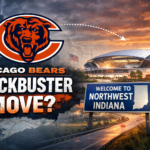Rob Manfred and MLB are Leaving ESPN
Major League Baseball (MLB) and ESPN have mutually agreed to end their long-standing television partnership following the 2025 season. The decision comes after MLB Commissioner Rob Manfred voiced frustration over what he perceived as diminishing coverage of baseball on ESPN’s platforms outside of live game broadcasts.

The current television contract between MLB and ESPN was initially set to run through 2028, but included an opt-out clause that had to be exercised by March 1. According to The Athletic, Manfred sent a memo to team owners expressing the league’s dissatisfaction, stating, “The league has not been pleased with the minimal coverage that MLB has received on ESPN’s platforms over the past several years outside of the actual live game coverage.”
A Shift in MLB’s Media Landscape
The termination of this long-standing partnership marks a significant shift in MLB’s media strategy. ESPN has been a major broadcaster of baseball for decades, providing national coverage, highlight segments, and in-depth analysis. However, with declining emphasis on baseball within ESPN’s general sports programming, MLB has opted to explore new media opportunities.
Manfred’s comments suggest that the league may seek partnerships that prioritize comprehensive coverage rather than just airing live games. With the rise of streaming services and digital sports media, MLB could be positioning itself for a new era of broadcasting deals beyond traditional cable television.
ESPN’s Response
ESPN issued a diplomatic response to the split, emphasizing its commitment to fiscal responsibility and audience growth across various platforms.
“We are grateful for our long-standing relationship with Major League Baseball and proud of how ESPN’s coverage super-serves fans. In making this decision, we applied the same discipline and fiscal responsibility that has built ESPN’s industry-leading live events portfolio as we continue to grow our audience across linear, digital, and social platforms. As we have been throughout the process, we remain open to exploring new ways to serve MLB fans across our platforms beyond 2025,” ESPN said in a statement.
As MLB looks to the future, speculation will grow regarding where its national broadcasts will land post-2025. With the increasing influence of streaming giants such as Amazon, Apple, and YouTube, the league may seek to capitalize on digital-first platforms to reach a broader audience.
Manfred’s decision to end the ESPN deal underscores MLB’s desire for increased media presence and engagement, setting the stage for a new era in the sport’s broadcasting landscape.








